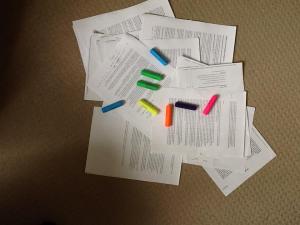To people who have never done it before, analysing qualitative data (interviews, observations, focus groups) seems like a bit of a mystery. And, to be honest, it often feels that way to those of us who have been doing it for years! The process usually involves an awful lot of reading, thinking, reorganising (or cutting & pasting), more reading and more thinking. Sometimes we talk to other researchers who are involved in our research teams, but it’s often a lonely and frustrating process. At the end of it all we can usually say a lot about what we’ve found, but we don’t talk much about how we got there. We also tend to skirt over how much our thoughts, feelings and assumptions have informed what we’ve found, preferring instead to give the impression that we have been able to objectively consider our data as if we’ve never seen it before despite having played a crucial role in generating it in the first place!
to other researchers who are involved in our research teams, but it’s often a lonely and frustrating process. At the end of it all we can usually say a lot about what we’ve found, but we don’t talk much about how we got there. We also tend to skirt over how much our thoughts, feelings and assumptions have informed what we’ve found, preferring instead to give the impression that we have been able to objectively consider our data as if we’ve never seen it before despite having played a crucial role in generating it in the first place!
Perhaps we don’t talk about the process much because as researchers we just ‘know’ how to analyse our data through years of practice and experience, but find it difficult to articulate that knowledge. Or perhaps it’s because we are trying to hold onto our position of power as those most able to decipher what is ‘really’ going on underneath the words and actions of our research participants. Either way, it’s rare for us researchers to talk openly, honestly and clearly about how we’ve analysed our data and even rarer to actually involve others in that analysis process.
As knowledge mobilisation researchers, we often fall into the same trap despite spending most of our time considering how different forms and sources of knowledge can be better brought into the research process. While we recognise that all sorts of people have valuable skills, experience and knowledge which, when combined, can make sure that research is both useful and usable, we frequently restrict ourselves to involving those people at the planning, data collection and dissemination stages of our research. We forget that their knowledge is likely to be equally valuable when we are grappling with analysing and interpreting our data.
It won’t surprise you to learn that I’ve been thinking about how we can do things differently and looking for methods to help. One of the methods I’ve found was developed by Brendan McCormack and colleagues and involves the use of creative practices (e.g. drawing, painting, photography, collage) during group analysis  workshops. The aim of the method is to tap into the impressions, thoughts and feelings (or ‘knowledge’) that is formed as people read and interact with a set of research data. Group discussion focuses on exploring what has been created during the workshop and using these to develop a deeper understanding of what the research has uncovered. You can find out more about the approach here (see Appendix A for a description of the method).
workshops. The aim of the method is to tap into the impressions, thoughts and feelings (or ‘knowledge’) that is formed as people read and interact with a set of research data. Group discussion focuses on exploring what has been created during the workshop and using these to develop a deeper understanding of what the research has uncovered. You can find out more about the approach here (see Appendix A for a description of the method).
For me, this creative approach presents an exciting possibility for levelling the playing field between researchers and other knowledge holders. It also seems like a useful way of helping people to tap into and articulate the kind of knowledge that is difficult to express in words alone. And if it does indeed enable a wider group of people to articulate and combine their knowledge and insights, it may even result in more meaningful research findings.

Pingback: Living processes vs. static barriers | KMb Researcher
Pingback: The power of stories | KMb Researcher
Pingback: Does Health Research Need More Creativity? – Performing Health
Pingback: Learning lessons about knowledge sharing | KMb Researcher
Pingback: Emotions & emotional labour in knowledge mobilisation – KMb Researcher